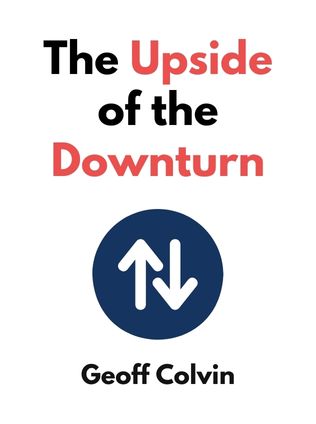
The Upside of the Downturn
Ten Management Strategies to Prevail in the Recession and Thrive in the Aftermath
By Geoff Colvin
Published 06/2009
About the Author
Geoff Colvin, a distinguished business journalist and best-selling author, serves as the senior editor at large for Fortune. Known for his insightful business commentary, Colvin writes the popular column "Value Driven" and is a regular moderator for the Fortune Global Forum. His first book, Talent Is Overrated, received international acclaim and was a bestseller in prestigious publications like the Wall Street Journal, BusinessWeek, and the New York Times. In The Upside of the Downturn, Colvin provides a roadmap for businesses navigating through economic recessions, offering practical strategies to not just survive but thrive.
Main Idea
Colvin's central thesis in The Upside of the Downturn is that recessions, while challenging, present unique opportunities for businesses to reinvent themselves and emerge stronger. The book challenges the conventional wisdom that focuses solely on cost-cutting and layoffs. Instead, Colvin argues that forward-thinking leaders can leverage these tough times to create competitive advantages and build long-term value. He presents ten strategies that businesses can adopt to navigate through recessions effectively, focusing on innovation, human capital, risk management, and strategic realignment.
Table of Contents
- The Greatest Opportunity
- The New Normal
- Firefighting: The Most Dramatic Form of Responding to a Crisis
- Reset Priorities
- Protect Your Most Valuable Asset
- Engage the Outside World
- Reexamine Your Strategy and Business Model
- Manage for Value
- Create New Solutions for Customers' New Problems
- Price with Courage
- Get Fitter Faster
- Understand All Your Risks
- Don't Forget to Grow Yourself
- For Next Time
The Greatest Opportunity
The economic downturn, despite its challenges, offers an unparalleled opportunity for transformation. As Colvin notes, "This downturn is worldwide, severe, deep, long, and novel." These characteristics create a fertile ground for businesses to innovate and overhaul outdated practices. The recession acts as a catalyst, pushing companies to reassess their operations, identify inefficiencies, and implement changes that might not have been possible in a booming economy. For instance, a company struggling with outdated technology can use the downturn to invest in modern systems, positioning itself for future growth once the economy recovers.
Sign up for FREE and get access to 1,400+ books summaries.
You May Also Like
Rich Dad Poor Dad
What the Rich Teach Their Kids About Money - That the Poor and Middle Class Do Not!
By Robert T. KiyosakiFreakonomics
A Rogue Economist Explores the Hidden Side of Everything
By Steven D. Levitt and Stephen J. DubnerThe Lean Startup
How Today's Entrepreneurs Use Continuous Innovation to Create Radically Successful Businesses
By Eric RiesWho Moved My Cheese?
An Amazing Way to Deal with Change in Your Work and in Your Life
By Spencer Johnson, M.D.Factfulness
Ten Reasons We're Wrong About the World – and Why Things Are Better Than You Think
By Hans RoslingMake Your Bed
Little Things That Can Change Your Life...And Maybe the World
By William H. McRaven



















